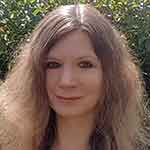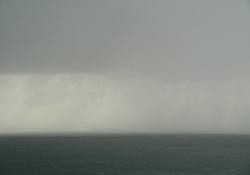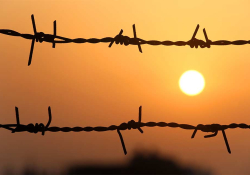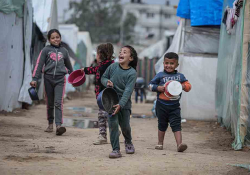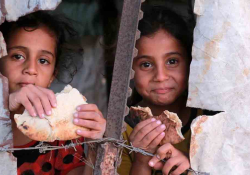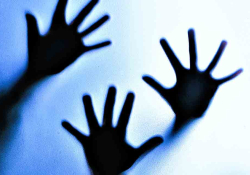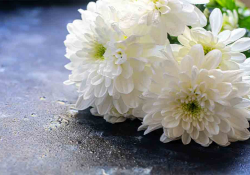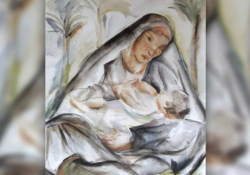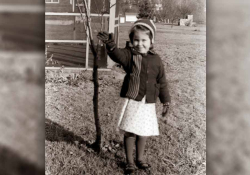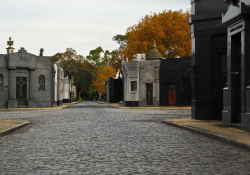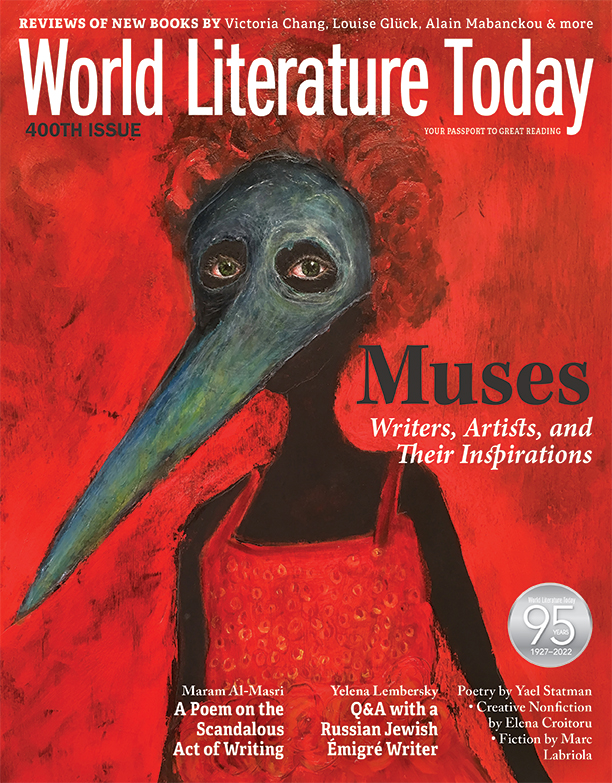Boundaries
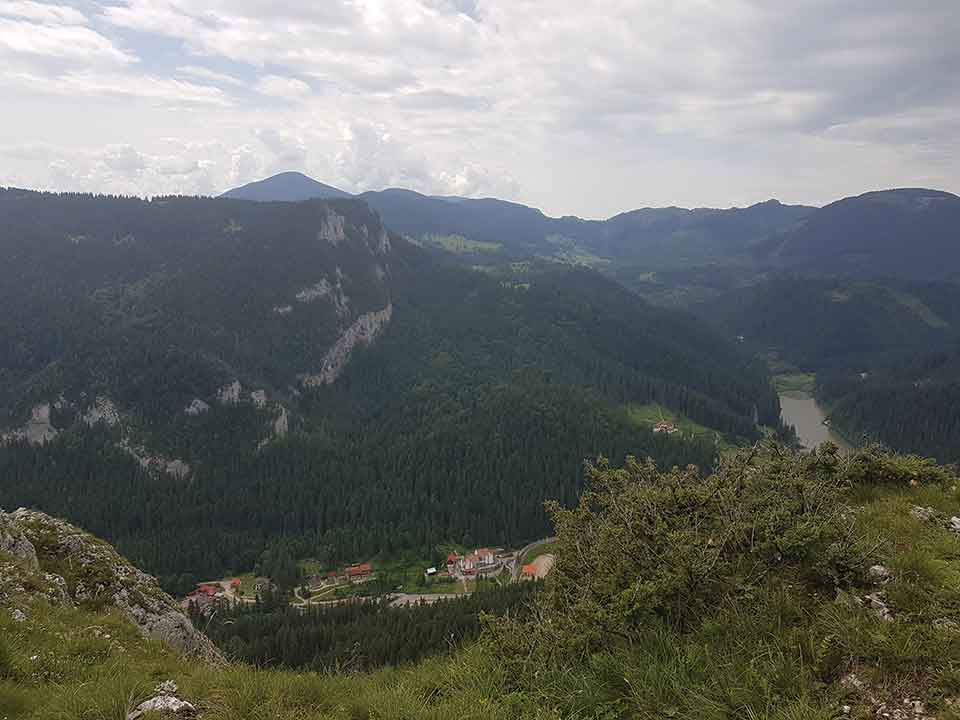
A countryside flâneuse in search of her deceased grandfather contemplates anchoring, wandering, and the small marks we leave on the world.
How does one get to know a person who passed away? I thought about that while I flew from London to Bacau, a city close to where my now-retired parents lived for most of the summer. All I had left of my grandfather—the person I wanted to know more about—were a few monochrome photographs with scalloped edges displayed in a family album.
My mother’s descriptions of him were sparse because the paths to her memories closed up over the years. She called him good-natured and said he’d loved the land he’d owned and that he’d spent a lot of his life riding horses or walking—something that resonated with my childhood self. When I was three he passed away, and later his letters and notes were destroyed in a flood.
My grandfather loved the land and understood that independence came from it.
AFTER THE PLANE landed, a cab drove me away from Bacau’s constellation of concrete tower blocks and from the bitter fumes of groaning buses, and into the land of vineyards, corn, and wheat crops. It was hot and the city was grinding itself up into dust and getting into our lungs. Once we reached the quilted countryside, it seemed as though I was going back in time, to the years when my life wasn’t as defined as it is now.
I spent my long childhood summers doing one of two things: either reading in the cool front room of my grandparents’ house, on top of a pile of itchy wool rugs hand-woven by my grandmother, or walking for kilometers on end and trying to get to the spectral blue peaks I saw in the distance. I didn’t know at the time that my wish was quixotic because the Tarcau Mountains were too far away.
My grandmother’s friends saw me as a wild girl because I took long trips on my own. I didn’t know at the time that I’d probably inherited this desire to walk from my grandfather.
FOR THE FIRST time in more than five years, I arrived in Măgirești, a village shaped like a fish spine with a bent tail. Time had shrunk its square, its restored medieval stone well, and its bodega, which still smelled of strong tuica, but it had not dulled the green of its hills.
Located at the foot of the forested Oriental Carpathians, it is built on an intricate terrain on which God seems to have spent a lot of time. It’s made up of verdant hillocks abundant in shrubs and medicinal herbs, streams that swallow paths after the springtime thaws, meadows, velvety hills studded with grazing sheep, stratified and shimmering escarpments, golden inselbergs and bottle-green ponds on which pieces of wood float like miniature boats. It’s a chamomile- and hay-scented symphony of textures and colors, a facsimile of the Shangri-La and a liminal space neighboring the malachite-green mountainscapes topped with a blue sawblade horizon.
The village adopts borderland characteristics. Fruit trees aren’t confined to orchards, so one can find an assortment of sour cherry, green plum, Mirabelle plum, cornelian cherry, walnut, and Jonathan apple trees (bearing sharp and aromatic fruits) living together on the same hill, communicating underground through their roots, sometimes overseeing muscat grapevines. When I heard that there are more trees on earth than there are stars in the Milky Way, I thought that the count could have started in this village.
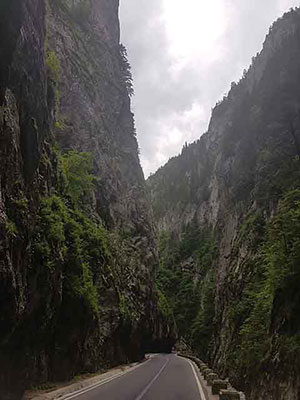
MY GRANDPARENTS HAD never moved away from this area. For people like them, who had experienced two world wars, living in the countryside must have seemed like a good life because they’d witnessed the destruction and bombings that people sometimes brought to one another and to their environment.
My grandfather loved the land and understood that independence came from it. He strived for self-sufficiency; hence he became a merchant and accumulated hundreds of acres that included pastures, arable land, and forests. All this, while garrisons were stationed in Măgirești.
He hired farmhands, used traditional farming methods, didn’t use pesticides, and did not overwork the soil, working to preserve the habitats of animals. According to my mother, he never thought about leaving his village, and I assumed that was because, in his view, making grand plans for life was not the same as living life. Perhaps he’d realized early on that he didn’t have much time. So why start all over again in a new place?
After reading works by John Muir, Robert Macfarlane, and J. A. Baker, among others, I realized that some of their books included people who had undergone the sort of transformation that I would describe as a rewilding of their souls. Reading about how some people effaced their boundaries with nature gave me the illusion that my grandfather had undergone a similar type of metempsychosis.
Maybe those born with an affinity with the land are rarer now since our societies have changed. I, for one, was an in-betweener drawn to both wilderness and cities, but also to the edge lands.
WHEN THE COMMUNISTS came to power after the war and told my grandfather that the land he’d bought with his savings was no longer his, something inside him must have broken. I could see that in a photograph which showed him standing in my parents’ living room, dressed in a black suit, a woolen vest and a white shirt, while a newly built, concrete city sprawled in the window behind him. There was nothing alive left in his gaze. He had the glassy expression of a man whose soul had lost itself in another world.
My grandfather had the glassy expression of a man whose soul had lost itself in another world.
My grandfather had a family to support, so he continued to work for the CAP enterprises while nostalgia took root inside him after the forced collectivization. My mother’s recollections acknowledge that, though not in these words.
Some of his friends hanged themselves in their stables while their horses watched. The cattle and sheep that had survived the repeated attempts from German and Russian soldiers to kill them were also taken into collective ownership.
My grandfather didn’t live long enough to see the revolution. He rotted in the ground he loved, and my grandmother followed him years later. When the land was returned to her, it came with a sour flavor of memory and reminded her of grandad as a young man and the period just after the war when things had seemed hopeful.
WHEN I WAS a child, I would leave my grandparents’ house early in the morning and take these trips in the general direction of the mountains. My walks took most of the day, and on my way I’d stop and study the rocks with unusual shapes, the movements beyond the surface of the green pond in the Valley of Sleep, or the clusters of yellow snapdragons, which looked like lion mouths.
I’d often walk past an abandoned house on the outskirts of the village. Weeds poked out through the gaps in its floor in search of light, and an elm sapling had grown out of a fractured, mossy wall. The rooms, which no longer had window frames, were covered in a peculiar wallpaper: a pattern made of a trio of burgundy brushstrokes. While inside this house, I wondered if it was at the edge of the wilderness.
I contemplated the death of its owners, and since the first time I saw that place, whenever I walked past an old-fashioned house, I wondered if older people lived in it. Over the years, I concluded that, as we age, most of us tame the wilderness inside us, while our houses and gardens start reflecting the disrepair of our bodies.
When I compared myself with the child who used to wander all day long, I found that a combination of growing older and moving to another country had changed me into a practical person. Nowadays, I monitor my schedule and set realistic expectations before each activity. But I still miss those trips that made me feel as though the mountains could be only one or two hills away.
WHY DID SOME people remain anchored to their place of birth while others wandered until they grew old? I had crossed several borders and lived in several countries before settling in England, whereas my grandfather never left his village.
I thought that most of us who traveled so far from our homelands did so because we wanted too much from the world. We tugged the threads of time by seeing as many unfamiliar lands as possible. Maybe we thought that if we lived faster, we lived more.
But since I was also working as a software developer, I had to gravitate toward big cities, where my trade was needed. These days, I’m surrounded by technology and help create it. There are wildlife conservation projects I’d like to get involved in, though I never seem to have time to take on new work. Many conservationists use drones to better understand echolocation in bats or birds or to survey penguin populations in the Antarctic. Others use camera traps to observe how wild animals use space after forest fires or to prevent conflicts between humans and wildlife.
Recently, a study on the endangered regent honeyeaters found that birds living in sparsely populated areas never got to learn songs from other honeyeaters, hence they copied the songs of other species of birds instead. The sounds coming out of their throats didn’t resemble the melodious warble of the original honeyeaters at all. It might have taken us longer to understand that without historical recordings.
AS I SAT at a shaky pine table in my parents’ front garden with a terracotta bowl of walnut cookies and my laptop, I thought about the fact that this sort of technology didn’t exist when I was growing up. As a child, I didn’t imagine people could have IT jobs that would allow them to spend so much time with nature.
I started thinking about how different my life was back in London and experienced a feeling of disassociation, as if that child years before who trekked all day was somebody else. Once I emigrated, I lost touch with my culture, I lost time with my family, but also with the land that I was used to.
Life in cities comes with an increase in anxiety that becomes addictive. To move away from it would create the impression of failure on some level. In urban environments, stimuli come our way every few minutes, so I often wondered if our thoughts are constantly assimilating those of others. This idea reminded me of the myth of Iona, who had been swallowed by a fish, which in turn was swallowed by another fish, and so on, ad infinitum. For me, that myth was a parable of how our lives are surrounded by layers that take us further and further away from our natural state. As our societies grow more and more complex, so do the layers surrounding us.
My grandfather’s life was a counterpoint to mine. After years of silent contemplation and observation, he must have arrived at his own conclusions about what the world had to offer. The land gave him happiness, and he’d gotten used to its silence, which he used to develop within. He spent most of his days outside, and sometimes he spent the night on a hill close to one of his sheepfolds.
Many of us urban dwellers still want to be in touch with the wild places because our cities never fall silent and we sometimes reach a point of saturation, a point at which our mechanized and noisy habitat has invaded our interior life so much that we no longer know who we are.
Once removed from urban noise, we discover the needs that drive us, the real anxieties that point at who we are and not the ones that merely distract us. We may again reach a tipping point of sorts, one characterized by loneliness, hence we need to go back. So maybe what has been historically unsettling about wilderness was what it revealed about us.
I SET OUT to walk along the Valley of Sleep again but couldn’t find the track that led to it. The leaf-whelmed terrain had erased its footpaths. While struggling to find my way, my mind went to the result of an MRI scan I was waiting for. I thought about how we divide our lives into periods of youth, of instability, of loneliness or sickness and about how we become like landscapes: crossed by boundaries. We know that at some point, we will venture past that last threshold beyond which our bodies can never get better.
THE LAST STOP of my trip was another borderland: the village churchyard at the top of the hill, behind my parents’ garden. Its irregular rows of crosses looked like a flock of birds turned to stone.
I sat down on the tall grass by my grandparents’ graves and thought that I’d spent most of my life working but not achieving much. Did that matter? The marks we all left on earth would be mixed with those of others, and they’d be indistinguishable anyway.
We all give back a part of what we’ve taken from the world.
A column of ants crossed my grandfather’s tombstone, and I couldn’t help think that while we change nature’s many forms wherever we go, nature, in turn, erases us: ants and beetles tear us apart, mouthful by mouthful, and plants create cracks in our abandoned houses. We all give back a part of what we’ve taken from the world.
The vestiges of our lives remain for a while: things we’ve written, lines along doorways to show that we have once grown taller, stains from when we spilled our wine while trying to forget a bad day. In due time, the boundaries we’ve drawn around us lose definition and are replaced by those of others.
We make our final return to the wilderness alone. Our energy is transformed for the benefit of other forms of life: the nocturnal closing of a morning glory flower, the drumming of a woodpecker, the germination of a walnut underground.
Thus we become the wilderness. Our atoms continue to exist, stripped of their conscience, forever part of the fabric of the world, interacting until the end of time. Meanwhile, the souls of all those people who loved us will be rewilded by grief.
Meanwhile, the souls of all those people who loved us will be rewilded by grief.
It was now evening. The moon gilded the tin church steeple, and it looked as if it was an eye that God had left behind. When that eye opened wide, it pulled some seas with it.
I wondered what my grandfather would have thought of the fact that none of his descendants will take over his land and maintain it.
By then, I’d written these lines about him in my notebook:
Once cattle and mongrels are drawn in ink
and crickets give rhythm to their sleep,
time is no longer a maze, and I hear
your heart beating again, in all these things.
My legs were slightly numb when I got up and climbed down the hill, asking myself, “Did anyone ever see the edges of the wilderness?”
Welling, Kent
